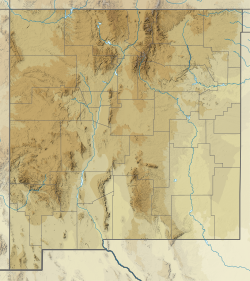The Lead Camp Limestone is a geologic formation in the San Andres Mountains of New Mexico. It preserves fossils dating back to the middle Pennsylvanian.[1][2]
| Lead Camp Limestone | |
|---|---|
| Stratigraphic range: | |
| Type | Formation |
| Underlies | Panther Seep Formation |
| Overlies | Lake Valley Limestone, Sandia Formation |
| Thickness | 320–861 ft (98–262 m) |
| Lithology | |
| Primary | Limestone |
| Other | Shale |
| Location | |
| Coordinates | 32°44′01″N 106°34′29″W / 32.7337°N 106.5746°W |
| Region | New Mexico |
| Country | United States |
| Type section | |
| Named for | Lead Camp Canyon |
| Named by | Bachman and Myers |
| Year defined | 1969 |
Description
editThe Lead Camp Limestone consists of 75% medium- to dark-gray cherty limestone and 21-24% calcareous shale. The base of the formation contains minor sandstone and conglomerate. The limestone forms prominent cliffs capping the southern San Andres Mountains. The total thickness is 320–861 feet (98–262 m).[1] The formation rests unconformably on the Lake Valley Limestone to the south and conformably on the Sandia Formation to the north.[2]
Deposition began in the late Morrowan (Bashkirian) to the south, spread to the north in the Atokan (early Moscovian, and continued into the Missourian (Kasimovian) Age.[2]
Fossils
editThe formation contains marine fossils in the calcareous shale beds. It contains fusulinids characteristic of the middle Pennsylvanian.[2]
History of investigation
editThe formation was first defined by George Bachman and Donald Myers in 1969, for exposures near the confluence of Lead Camp and San Andres Canyons.[1]
See also
editFootnotes
edit- ^ a b c Bachman & Myers 1969.
- ^ a b c d Kues & Giles 2004.
References
edit- Bachman, George O.; Myers, Donald A. (1969). "Geology of the Bear Peak area, Dona Ana County, New Mexico". U.S. Geological Survey Bulletin. 1271-C. doi:10.3133/b1271C.
- Kues, B.S.; Giles, K.A. (2004). "The late Paleozoic Ancestral Rocky Mountain system in New Mexico". In Mack, G.H.; Giles, K.A. (eds.). The geology of New Mexico. A geologic history: New Mexico Geological Society Special Volume 11. pp. 95–136. ISBN 9781585460106.

